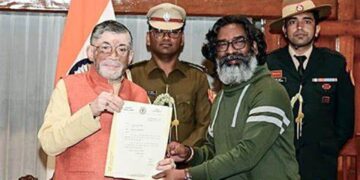Mob lynching, a brutal and inhumane act where a crowd collectively kills an individual, often based on unfounded accusations or social tensions, has emerged as a pressing issue in many societies worldwide. Understanding the underlying factors and triggers of mob lynching is crucial for developing effective strategies to prevent such violent acts. This article delves into the root causes and psychological triggers of mob lynching.
Historical Context: Mob Lynching

Read also: Rajasthan Political Surveillance: Ex-OSD Lokesh Sharma Accuses Gehlot Govt. of Illegal Phone Tapping
Mob lynching is not a new phenomenon. Historically, it has been used as a tool for social control, often rooted in deep-seated prejudices and systemic inequalities. In the United States, for example, lynching was predominantly targeted at African Americans in the post-Civil War era as a means to enforce racial segregation and suppress civil rights. Similar patterns can be observed in other parts of the world where marginalized communities have been targeted.
Social and Economic Factors
- Social Inequality and Prejudice: Mob lynching often occurs in societies where social hierarchies and prejudices are deeply entrenched. Discrimination based on race, religion, caste, or ethnicity can fuel mob violence. These prejudices create an “us vs. them” mentality, dehumanizing the victims and justifying the violence in the minds of the perpetrators.
- Economic Disparities: Economic hardships and unemployment can exacerbate social tensions. In communities where resources are scarce, competition for survival can lead to scapegoating and violence against perceived “others.” Economic stress can also make individuals more susceptible to manipulation by those who seek to incite violence for personal or political gain.
Psychological Triggers
- Group Psychology: The psychology of crowds plays a significant role in mob lynching. When individuals become part of a mob, they often experience a loss of personal responsibility and moral accountability. This phenomenon, known as deindividuation, can lead to behaviours that individuals would not typically engage in alone.
- Fear and Misinformation: Mobs are often driven by fear and misinformation. Rumours, often spread through social media or word of mouth, can escalate quickly and incite panic. In many cases, false accusations or sensationalized stories about the victim trigger the violence.
- Authority and Leadership: The presence of authoritative figures or charismatic leaders can also influence mob behaviour. Leaders who advocate for violence or provide implicit approval can embolden the mob, legitimizing their actions and reducing feelings of personal guilt.
Cultural and Political Factors
- Cultural Norms: In some societies, cultural norms and traditions may tacitly endorse mob justice. When formal legal systems are perceived as ineffective or corrupt, communities may resort to vigilantism, believing that they are upholding justice.
- Political Manipulation: Politicians and leaders may exploit social divisions and use mob violence to further their own agendas. By inciting mob lynching, they can divert attention from political failures, mobilize support, or intimidate opponents.
Preventive Measures
Addressing the root causes of mob lynching requires a multifaceted approach:
- Education and Awareness: Promoting education and raising awareness about the dangers of mob lynching and the importance of critical thinking can help counteract misinformation and prejudice.
- Strengthening Legal Systems: Ensuring that legal systems are robust, fair, and efficient can reduce the perceived need for mob justice. Swift and transparent legal processes can restore public confidence in the rule of law.
- Community Engagement: Building strong, inclusive communities that promote dialogue and understanding across different social groups can help mitigate social tensions. Community leaders and organizations can play a key role in fostering harmony.
- Regulating Social Media: Given the role of social media in spreading rumors and inciting violence, it is crucial to develop and enforce regulations that prevent the dissemination of harmful content. Social media platforms should also be proactive in monitoring and addressing hate speech and misinformation.
Mob lynching is a complex and multifaceted issue that arises from a combination of historical, social, economic, psychological, cultural, and political factors. By understanding these underlying causes and triggers, societies can develop comprehensive strategies to prevent such violence and promote justice and equality. Addressing mob lynching requires collective efforts from governments, communities, and individuals to build a more just and humane world.
To get more out of our exclusive news, Join us on our WhatsApp Channel, Facebook, and Instagram.















